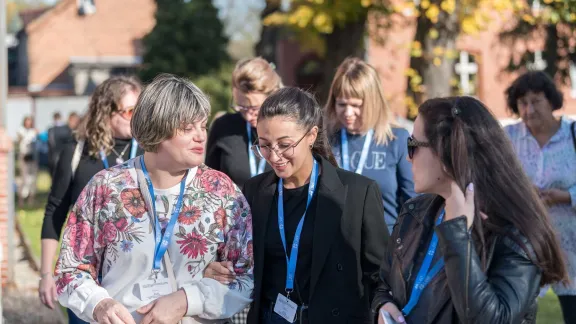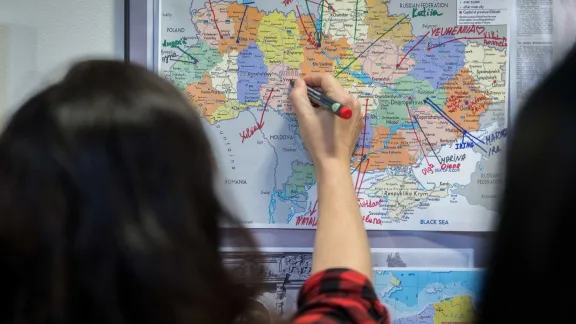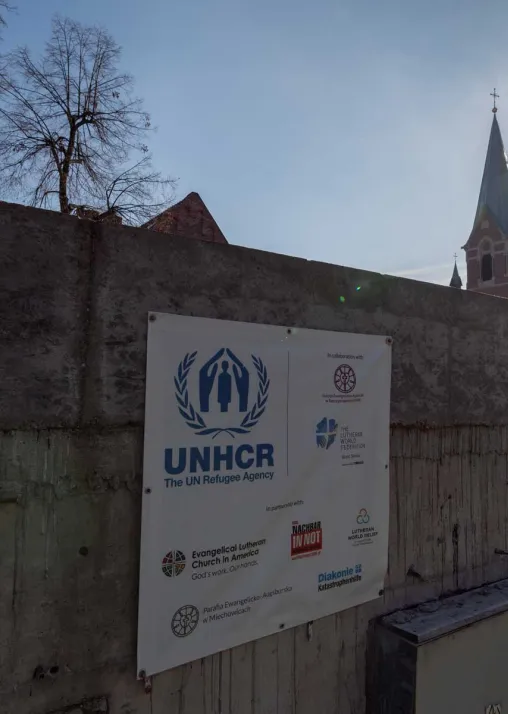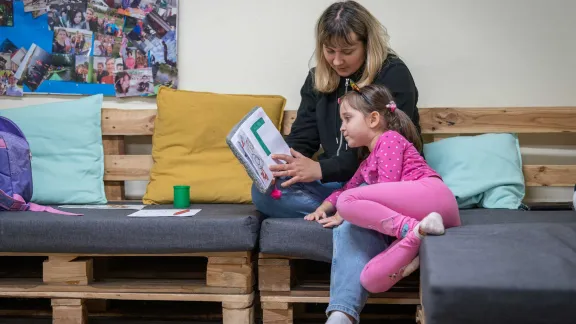LWF expands its refugee response in Poland into the areas of protection, social cohesion, and education. A workshop on community based psychosocial support equipped Ukrainian refugee staff from around the country for the new tasks.

Staff from multi-purpose cash assistance centres across Poland – established to support incoming refugees to Poland from Ukraine – gather in Bytom for a full-week training in 'community-based psychosocial support' provided through ACT Church of Sweden. All photos: LWF/Albin Hillert
Local and refugee staff trained in psychosocial support
(LWI) - Eight months into the war in Ukraine, the needs of the refugee and host communities in Poland are shifting. What initially was primarily a cash-based response on behalf of the LWF will now be expanded into the areas of protection and social cohesion, as well as education. LWF equipped 48 staff from around the country with a workshop on community based psychosocial support (CBPS). Many of the staff are refugees themselves.
Through a variety of exercises the participants explored the core principles of mental health and psychosocial support, psychological first aid and good practices in support to people living through a humanitarian crisis. The training is offered through ACT Church of Sweden, the ACT Alliance lead member for work in this area of crisis response. It is one significant part of the LWF’s long-term crisis response, as it builds capacity for a gradual shift towards supporting people’s needs more holistically.

A woman marks on a map what part of Ukraine she comes from, LWF staff – most them refugees from Ukraine – gather for the training in Bytom, Poland. Photo: LWF/Albin Hillert
Building community, growing to be leaders
Bringing together staff from all the LWF-supported centers in Poland, the training helped build a sense of community, said Katiia Kharytoniuk. The mother of two daughters, arrived in Poland from Uman, Ukraine, in March 2022, and now lives in a building belonging to the Evangelical Church of the Augsburg Confession in Poland, an LWF member church. She said the training was essential in helping to understand the boundaries for when staff can provide support to refugees at the centers, and when it is time to hand over to a specialist for psychological support.
“I am also excited to meet the staff from all the other centers. I feel we are already building very warm relationships and friendships with each other. It is great,” she said.
Iryna Volkova, a Ukrainian English teacher, and psychologist who arrived in Poland from Mariupol with her two children in April 2022 said she thinks the training will be helpful in her work at the LWF center in Bielsko. “Being refugees ourselves, we need this when we talk to other people: How can we live together, how we can develop, find work, and how to live after the horrors of war.”
As refugees ourselves, we need this when we talk to other people, about how we can live together, how we can develop, find work, and how to live after the horrors of war.
Iryna VOLKOVA, LWF staff and Ukrainian refugee
On the first day of the training, participants went through an exercise of ‘lead and follow’, whereby they took turns in closing their eyes and trusting that the other would lead the way to where they needed to go.
“I lived the war from the inside, in Azovstal,” Volkova reflected. “When we did the exercise of ‘lead and follow,’ we saw what it is like to shift roles. I think the war changed me. Before the war I was more of a follower. Today, I feel like a leader,” she added.

A sign leads the way towards the entrance of the LWF centre in Bytom, Poland, located at the Evangelical Church of the Augsburg Confession in Poland parish in Bytom. Photo: LWF/Albin Hillert
A long-term, holistic crisis response
“The LWF has made a commitment to this kind of help, standing beside people in difficult situations. My hope is to give the people here tools and ideas to be able to work with the community, as partners, and to respond to the day-to-day needs of refugees here in Poland,” said Kathy Angi, a US-based psychosocial consultant with ACT Church of Sweden, who co-chaired the training. “The participants here are all people who want to do something constructive to help.”

Katiia Kharytoniuk (37) and her daughter Sofija (5) from Uman, Ukraine, now live in a building of the Evangelical Church of the Augsburg Confession in Poland parish in Bytom. Photo: LWF/Albin Hillert
From the beginning, the LWF employed refugees themselves as staff its centers. This provides not only a source of income for Ukrainian refugees, but a sense of purpose on multiple levels.
The first phase of the LWF Ukraine response was focused on multipurpose cash-based assistance, with psychologists and social workers being available mainly for urgent emergency support where needed, explained Andrzej Kosno, Cash Programme Coordinator at the LWF country office in Warsaw.
"The cash-based support will continue, but our focus will be different and our activities open not only to refugees, but also the host community of Polish citizens,” Kosno said. “Our centers are changing from being cash-assistance centers into community centers.”
With a country office in Warsaw, the LWF’s Poland program runs six multi-purpose cash assistance (MPCA) centers in cities around the country. These centers respond to the needs of refugees together with the United Nations High Commissioner for Refugees (UNHCR) and the Evangelical Church of the Augsburg Confession in Poland, an LWF member church.
In September 2022, the six MPCA centers had supported a total of 60,295 Ukrainian refugees over the country.


